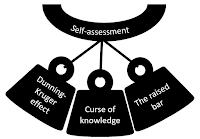3 Ways in which self-assessment may demotivate
How you look at your own progress determines how competent and motivated you will feel. A way of working which is not well-suited for this, is to grade your own competence level. There are at least three reasons why this type of self-assement is slippery and unreliable: (1) the Dunning-Kruger effect, (2) the curse of knowledge, and (3) the raised bar.
(1) The Dunning-Kruger effect is the at first sight curious phenomenon that people who are low in competence in a certain area usually overestimate their own competence the most while people who grow in competence get more realistic and modest in their self-assessment. This phenomenon is most likely caused by the fact that people with low competence lack insight into their own competence. They do not realize everything their is to know about the area so they do not what they lack in knowledge and skills. Here, you can read more about this: The Dunning–Kruger effect.
(2) The curse of knowledge is the also curious phenomenon that once you have acquired a certain knowledge or skill you no longer realize how it is not to possess this knowledge or skill (read more about this: The curse of knowledge). This phenomenon also leads you to view what you once found hard as easy. Moreover, you do not remember how hard you once found it to learn it. This may lead to the situation that knowledge, which you once viewed as hard and desirable, you now view as 'nothing special'. The curse of knowledge may cause you to underestimate parts of your competence.
(3) The raised bar is the phenomenon that while you emerge yourself in something which you find interesting or important you may raise the demands you set on yourself. This probably mostly happens without you being consciously aware of it. While you become more competent, your knowledge growths about everything their is to know due to which you encounter new things you might ask of yourself. Setting these new demands on yourself changes the measuring stick with which you assess yourself.
Due to these three effects, grading your own competence may demotivate you and disguise the fact that you have become better at something. There are more effective ways of reflecting on your progress, such as the circle technique. This technique not only offers you insight into the progress which you have achieved (due to which your feeling of competence may grow) but also into the progress you further want or need to achieve (due to which your motivation to proceed grows).
(1) The Dunning-Kruger effect is the at first sight curious phenomenon that people who are low in competence in a certain area usually overestimate their own competence the most while people who grow in competence get more realistic and modest in their self-assessment. This phenomenon is most likely caused by the fact that people with low competence lack insight into their own competence. They do not realize everything their is to know about the area so they do not what they lack in knowledge and skills. Here, you can read more about this: The Dunning–Kruger effect.
(2) The curse of knowledge is the also curious phenomenon that once you have acquired a certain knowledge or skill you no longer realize how it is not to possess this knowledge or skill (read more about this: The curse of knowledge). This phenomenon also leads you to view what you once found hard as easy. Moreover, you do not remember how hard you once found it to learn it. This may lead to the situation that knowledge, which you once viewed as hard and desirable, you now view as 'nothing special'. The curse of knowledge may cause you to underestimate parts of your competence.
(3) The raised bar is the phenomenon that while you emerge yourself in something which you find interesting or important you may raise the demands you set on yourself. This probably mostly happens without you being consciously aware of it. While you become more competent, your knowledge growths about everything their is to know due to which you encounter new things you might ask of yourself. Setting these new demands on yourself changes the measuring stick with which you assess yourself.
Due to these three effects, grading your own competence may demotivate you and disguise the fact that you have become better at something. There are more effective ways of reflecting on your progress, such as the circle technique. This technique not only offers you insight into the progress which you have achieved (due to which your feeling of competence may grow) but also into the progress you further want or need to achieve (due to which your motivation to proceed grows).

Comments